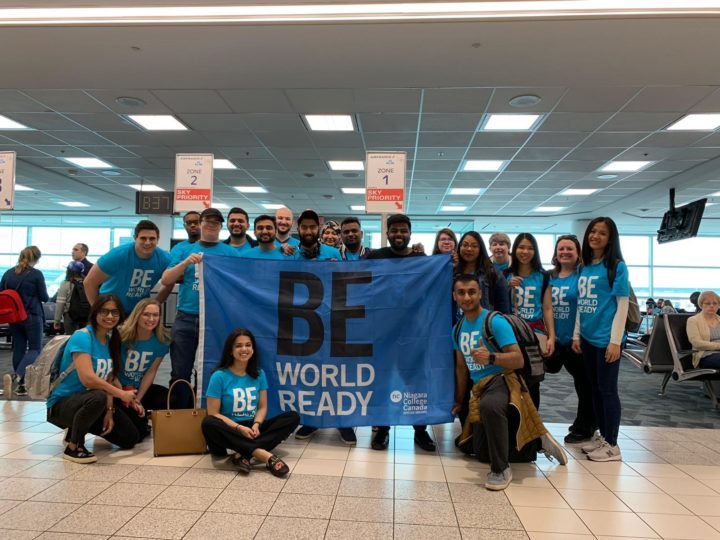Building on the success of NC’s inbound exchange with one of the College’s longest standing international academic partners, Hochschule Bremen, the two academic institutions partnered to deliver an accelerated Global Education course in Bremen, Germany, as part of a Be World Ready (BWR) International Field Studies (IFS) trip, April 21 to May 1.
Over 20 NC students had the opportunity to work with German peers throughout the course, expanding both student groups’ intercultural skillsets and broadening their international networks.
“International trade is a global activity. Understanding cultures and what’s important to people and their societies can foster or break business relationships,” noted Tenesia Benjamin, a first-year Human Resource Management student. “This trip gave me the opportunity to work with NC and German students who I did not know, and to develop skills required to effectively function and work in a multicultural society.”
The IFS trip also created first-time experiences for International Commerce and Global Development student, Jasper Zawadzki. “I had never visited North-Western Germany before, nor had I had the experience of studying within a foreign institution,” said Zawadzki. The IFS trip allowed him to develop and apply intercultural communication skills and learn how working in global multi-cultural teams is an asset for an international firm. “I would highly recommend BWR as part of any holistic learning plan,” said Zawadzki. “The opportunity to earn credits and utilize some practical application of your studies is a worthwhile experience.”
Rainer Lisowski, PhD, professor of Public Management at Hochscule Bremen, shared how students from Niagara and Bremen both benefitted from the IFS. “Even within a week you can really feel intercultural differences not only within classroom when you have to work in intercultural groups to fulfil your task, but also off-campus during site visits or leisure activities,” said Lisowski. “Intercultural differences often reveal themselves in the small things: the question of, ‘Do we meet in ten minutes’ literally means ten minutes, or is that just a phrase which can be interpreted differently between different cultures?”
IFS trip lead and professor in NC’s International Business and Management program, Stefan Johnson, shared that there were plenty of learning opportunities for students, one being communication. “Students were required to be cognizant of the way in which they spoke, and the key non-verbal communication cues in order to appropriately communicate with community members in Bremen who were not as strong,” said Johnson. “As importantly, students were provided with strong marketing frameworks, which will be useful in the classroom in future courses.”
Johnson noticed positive changes in the way students worked together over the course of the first three days, noting considerable growth by the final day in which groups were high-functioning and focused on common interests and goals. “The final presentations seemed to come together well and, on a whole, the changes in attitude were apparent,” said Johnson. “Though learning styles were different, the output was very similar in nature.”
Johnson said the trip had an impact on his own classroom teaching practices, exposing him to new in-class tools and methods. “Anytime faculty have the opportunity to observe other faculty in different institutions, or even lead classes in front of different student bodies, it is an opportunity for professional development.”
In addition to in-class activities, the Global Education course consisted of industry site visits for students to experience international business practices first-hand and to gain a better understanding of the country’s business fundamentals. “Our site visit to the Mercedes-Benz plant was an eye-opening experience for the sheer amount of industry for a state of 600,000 people,” said Zawadzki. “On our way to Bremerhaven via train, we could see these vehicles on the tracks ready for export through the port, creating a beautiful tie-in to my studies of international trade.”
For Benjamin, the part of her trip that made the biggest impact was visiting Anne Frank’s House in Amsterdam. “It was an extremely emotional experience, and I never knew that I, as a Black woman, would identify so much with her [Anne Frank’s] struggle and that of the Jews,” she said. “It made me appreciate the “helpers” who fought to keep them safe. I can only imagine their moral dilemma to fight for and protect innocent people, but also the internal conflict they must have felt knowing that being caught could have dire consequences for them and their loved ones. I left motivated and inspired, but mostly encouraged that, despite the pain that exists and can be caused by others, the drive to survive and “the helpers’” support that we, as a people, will be okay.”


